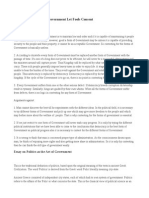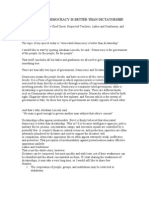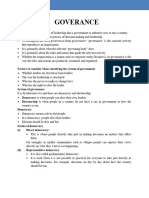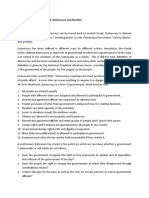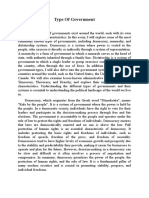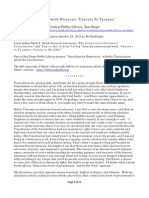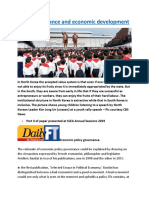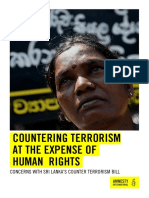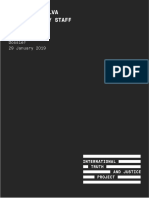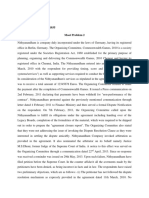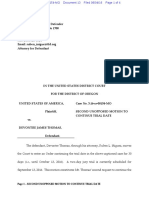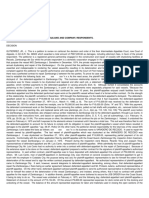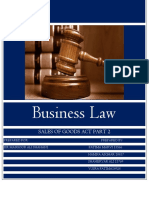Dictators and Other Rulers
Dictators and Other Rulers
Uploaded by
ThavamCopyright:
Available Formats
Dictators and Other Rulers
Dictators and Other Rulers
Uploaded by
ThavamCopyright
Available Formats
Share this document
Did you find this document useful?
Is this content inappropriate?
Copyright:
Available Formats
Dictators and Other Rulers
Dictators and Other Rulers
Uploaded by
ThavamCopyright:
Available Formats
Dictators and other rulers
by Rukshana Nanayakkara-Monday, 09 Sep 2013
There is a great rush to prove that we are not a dictatorship. Navi Pillays statement has hurt the governments farce values adhered to in our governance, even though we did not hear what we wanted to hear from the United Nations High Commissioner for Human Rights. The President is denouncing Pillays authoritarianism assertions and is loudly counter asserting that we hold elections, regularly. Since 2005 we have had 11 elections in the country. A dictator is someone, who does not hold elections and works for his own interest. This claim of the President warrants a reflection as to what makes dictatorial governance as opposed to a functioning democracy. Lets analyze what makes a dictator. Most dictators have several characteristics in common. I have selected a few characteristics which are easier for us to relate to. Many dictators groom cults of personality, a form of hero-worship where the people are fed with information geared to hero-worshiping. They claim to be flawless and in account, act in the best interest of the country. They portray their so called character in public venues through statues, murals, posters and paintings bearing their images. Elections held in controlled circumstances Dictators command the control over the military of the state. Many dictators were in fact military commanders prior to gaining power. Under such regimes, governance hinges more upon the trust of the military over civil administration. The forces are indeed loyal to the dictators. The military is championed and over-compensated for their work than any other branch of government. Some dictators do allow elections. But often elections are held in controlled circumstances, obviously manipulating power to gain the advantage or to muzzle down the opposition. For example, under extreme pressure, Saudi Arabian King, Abdullah Bin Abdul Aziz al-Saud allowed municipal elections in 2005, the first election that country had since the 1960s. However, women were largely left out of the elections, even though they were not openly banned from voting. Many women did not have photo identification to vote, there were inadequacy of female poll workers to register women in a context where men could not register women for voting.
The power vested within a king was manipulated for his personal gain. Often elections held in authoritarian regimes control resources within the regimes control to manipulate the outcome of the election. Dictators stay in power for a very long time. In disguised dictatorships, this is done through the manipulation of law and order, which facilitates them to stay in power for a long period. They groom a group of henchmen to laud their conduct or a group of family members, who equally benefit from the dictatorial rule. They become the utmost confidants of the ruler. In the event of the demise of the dictators due to natural causes, such family confidants are groomed to replace them.
Garb of benevolence Certain dictators wear the garb of benevolence, so they are called benevolent dictators. They exercise and justify the absolute power held for the so-called greater common good of the people. Many dictators champion mega development projects and promote the sacrifice of any dissident for the benevolence of the common masses. Any opposition to the dictators development ideology is deemed traitorous. A good example of such a ruler is Fidel Castro, whose supporters believed him to be a benevolent dictator. All dictators however, have a common enemy: The space for civil society. In many authoritarian regimes, there are organized campaigns against non-governmental organizations. The local NGOs are branded as puppets of western conspiracies. International human rights organizations such as Human Rights Watch or Amnesty International becomes the targets of their vilification. According to dictators, western governments, who find their governance on democratic values (I am not referring to absolute democratic values) wanting, are accused of doing so in consultation with these NGOs to dismantle their power base and destabilize the country. Living in a dictatorship or authoritarianism for a prolonged period of time could easily delude the citizens about its so called benefits. Therefore, the values of democratic governance should find equal breath and space for discussion. Elections held in free and fair environment is a basic characteristic of a democracy. However, its values and significance lie in between elections. The power vested with the government for a period of time should be guarded for the interest of the people at all levels. In multi-ethnic, multi-religious environments, the prime function of a democracy is to protect the basic human rights of all ethnicities and religions and provide the opportunity to organize and participate fully in the political, economic and cultural life of society. Thus citizens in a democracy have the right to protect their rights and
freedoms and stand against the dictatorial decisions of a government. A brilliant opportunity At a time when election are being held, it is a brilliant opportunity of citizen of Sri Lanka to engage in a discussion of democracy and its parameters, and identify what makes us different from a dictatorship. Unfortunately, the President himself is on a prime campaign to discredit the demand for democratic values. Instead of a grounded and open discussion on what make our nation progress, we continue to live in denial of issues that should be of concern to us. In the Presidents words, external forces are attempting to create a situation similar to the Arab Spring in the Middle East to change the regime. The regime is clearly intolerant of opinions that are contrary to the mainstream government propaganda. In Mahatma Gandhi words, Intolerance is itself a form of violence and an obstacle to the growth of a true democratic spirit.
You might also like
- Customary Law in Uganda - Simon M. SsemagandaDocument12 pagesCustomary Law in Uganda - Simon M. SsemagandaCynthia Auma67% (6)
- Democracy Vs DictatorshipDocument20 pagesDemocracy Vs DictatorshipArshnoor BediNo ratings yet
- Dictatorship +: THE OF HistoryDocument22 pagesDictatorship +: THE OF Historysuzy kindomNo ratings yet
- American Government and Civic EngagementDocument12 pagesAmerican Government and Civic EngagementVanyaNo ratings yet
- Dictatorship - DemocracyDocument8 pagesDictatorship - DemocracyRoseann Denise Gunda-PagcaliwanganNo ratings yet
- Difference Between Democracy and Dictatorship - Important IndiaDocument9 pagesDifference Between Democracy and Dictatorship - Important IndiaAna JainNo ratings yet
- Democracy VS DictatorshipDocument5 pagesDemocracy VS DictatorshipKholah Rizwan100% (1)
- Ch-1 WHAT IS DEMOCRACY, WHY DEMOCRACYDocument6 pagesCh-1 WHAT IS DEMOCRACY, WHY DEMOCRACYhoppingreyanshNo ratings yet
- EssayDocument48 pagesEssaybrijesh113No ratings yet
- Chap 7 Politics in DevelopmentDocument9 pagesChap 7 Politics in DevelopmentQùïñ SnyderNo ratings yet
- Authoritarian Countries in 21ST CenturyDocument13 pagesAuthoritarian Countries in 21ST Centuryyash A.No ratings yet
- " C"C C C C: CCCC C C !#$%CDocument26 pages" C"C C C C: CCCC C C !#$%CAmna AkberNo ratings yet
- Social Science EnglishDocument42 pagesSocial Science EnglishSreejith SureshNo ratings yet
- Contemporary World Reflection PaperDocument8 pagesContemporary World Reflection PaperNyna Claire GangeNo ratings yet
- ElectoralAndPoliticalReformsInIndiaForMPS2011 12feb2011Document19 pagesElectoralAndPoliticalReformsInIndiaForMPS2011 12feb2011Sreekanth ReddyNo ratings yet
- Democracy and Autocracy Aug2012Document2 pagesDemocracy and Autocracy Aug2012Prayogo TioNo ratings yet
- DictatorshipDocument4 pagesDictatorshipSupercavitating TorpedoNo ratings yet
- Authoritarian Rule Part 1Document22 pagesAuthoritarian Rule Part 1Eevee CatNo ratings yet
- Wagan POLSCI301 Assign 0913Document8 pagesWagan POLSCI301 Assign 0913Anthony WaganNo ratings yet
- Essay On Government of IndiaDocument12 pagesEssay On Government of Indiaakash1478No ratings yet
- Democracy 2Document7 pagesDemocracy 2nicola maniponNo ratings yet
- Sample Essay in PoliticsDocument2 pagesSample Essay in PoliticsKris Elaine Gandia FiguracionNo ratings yet
- Summary: The Idea that Is America: Review and Analysis of Anne-Marie Slaughter's BookFrom EverandSummary: The Idea that Is America: Review and Analysis of Anne-Marie Slaughter's BookNo ratings yet
- Submitted To:: Sir. Muhammad HanifDocument9 pagesSubmitted To:: Sir. Muhammad HanifMuhammad Asim QaseemNo ratings yet
- What Democracy Is and IsnotDocument3 pagesWhat Democracy Is and IsnotJay PowNo ratings yet
- Democratic & DictatorshipDocument15 pagesDemocratic & DictatorshipRoyal Raj AligNo ratings yet
- Vidallo Sabandal Compre TrendsDocument7 pagesVidallo Sabandal Compre TrendsSABANDAL, Jean Grace A.No ratings yet
- What Are The Characteristics of Authoritarian GovernmentDocument3 pagesWhat Are The Characteristics of Authoritarian GovernmentNalini Lini89% (18)
- Types of GovernmentDocument7 pagesTypes of GovernmentJscovitchNo ratings yet
- DictatorsDocument2 pagesDictatorssinisop164No ratings yet
- Chapter 10: DemocracyDocument13 pagesChapter 10: DemocracyLovely HerreraNo ratings yet
- Basic Liberal ValuesDocument5 pagesBasic Liberal ValuesAung Kyaw MoeNo ratings yet
- Aristotle - EssayDocument3 pagesAristotle - EssayyeiwjwjsNo ratings yet
- Speech On Democracy Vs DictatorshipDocument3 pagesSpeech On Democracy Vs DictatorshipZeeyah KhanNo ratings yet
- DifferencesBetweenDemocraticAndNon ASSIGNMENTDocument8 pagesDifferencesBetweenDemocraticAndNon ASSIGNMENTshakeelahmadansari.0x0No ratings yet
- GOVERANCE Grade 8Document9 pagesGOVERANCE Grade 8ErnestNo ratings yet
- Democracy - English 24-05-18Document4 pagesDemocracy - English 24-05-18cyberNo ratings yet
- Forms of GovernmentDocument17 pagesForms of GovernmentJames Bryan Pepico100% (1)
- Unit 4 and 5 6Document30 pagesUnit 4 and 5 6rahimaNo ratings yet
- Type of GovernmentDocument3 pagesType of Government17 Zay Lin Htet A04No ratings yet
- Pak Studies Assignment 3Document4 pagesPak Studies Assignment 3Inaya ImranNo ratings yet
- CP Research PaperDocument9 pagesCP Research PaperMerna MansourNo ratings yet
- Mark E Smith - Consent To TyrannyDocument11 pagesMark E Smith - Consent To TyrannyJohn SutherlandNo ratings yet
- 4.2 Types of Political Systems: Learning ObjectivesDocument9 pages4.2 Types of Political Systems: Learning ObjectivesDarry BlanciaNo ratings yet
- Democracy FactsDocument7 pagesDemocracy Factswasif28No ratings yet
- Jagannath University: Assignment OnDocument11 pagesJagannath University: Assignment OnMominul IslamNo ratings yet
- Mill'S "On Liberty": Dudiki Yamini Ma Political Science 18399011Document9 pagesMill'S "On Liberty": Dudiki Yamini Ma Political Science 18399011YaminiNo ratings yet
- Critiques of Theories of The State Patriarchal TheoryDocument3 pagesCritiques of Theories of The State Patriarchal Theoryflexton campbellNo ratings yet
- What Is Democracy?Document35 pagesWhat Is Democracy?romeojr sibullasNo ratings yet
- 64e820f3e39495and6 Concept DemocracyDocument186 pages64e820f3e39495and6 Concept DemocracyAnishaNo ratings yet
- Democracy - An Ideal Form of GovernmentDocument9 pagesDemocracy - An Ideal Form of GovernmentasfaNo ratings yet
- 13 PoliticalsystemsDemocraticandNonDemocraticDocument9 pages13 PoliticalsystemsDemocraticandNonDemocraticJaidi Singnar PatorNo ratings yet
- Why Bother With Elections? - Adam Przeworski: Chapter 1 - IntroductionDocument20 pagesWhy Bother With Elections? - Adam Przeworski: Chapter 1 - IntroductionEugenia WahlmannNo ratings yet
- Mohamed Hashi - SOA-1101 - Midterm.Document8 pagesMohamed Hashi - SOA-1101 - Midterm.mohamed.hashiug24No ratings yet
- Quasi Democracies of The WorldDocument3 pagesQuasi Democracies of The WorldZiauddin ChoudhuryNo ratings yet
- Democracy and Islam by AbubakarDocument4 pagesDemocracy and Islam by Abubakar023163abubakarsiddiqNo ratings yet
- Slide - Session 5 - Classification and Forms of GovernmentDocument34 pagesSlide - Session 5 - Classification and Forms of GovernmentAbdullah JayedNo ratings yet
- International TradeDocument7 pagesInternational Tradetalithaonkabetse723No ratings yet
- Sem1.R Rohan - Political Theory-SACE.1820181952Document16 pagesSem1.R Rohan - Political Theory-SACE.1820181952R rohanNo ratings yet
- Handout+1 +Forms+of+Government+Gallery+Walk+PlacardsDocument6 pagesHandout+1 +Forms+of+Government+Gallery+Walk+Placardsjahniadudley62No ratings yet
- GovernmentsDocument6 pagesGovernmentsmuhammad shoaib jamilNo ratings yet
- Our Duty To Fight' The Rise of Militant BuddhismDocument21 pagesOur Duty To Fight' The Rise of Militant BuddhismThavamNo ratings yet
- George Nader How A Convicted Paedophile Became Key To An Emirati Hook Up With TrumpDocument18 pagesGeorge Nader How A Convicted Paedophile Became Key To An Emirati Hook Up With TrumpThavamNo ratings yet
- Sri Lanka Nagananda Filed Corruption Case Against Judges in Top CourtDocument25 pagesSri Lanka Nagananda Filed Corruption Case Against Judges in Top CourtThavamNo ratings yet
- NECC SriLanka To 40 TH Session of The UNHRC February 2019 English 2 PDFDocument15 pagesNECC SriLanka To 40 TH Session of The UNHRC February 2019 English 2 PDFThavamNo ratings yet
- Murder, Rape and Claims of Contamination at A Tanzanian GoldmineDocument19 pagesMurder, Rape and Claims of Contamination at A Tanzanian GoldmineThavamNo ratings yet
- Uksc 2017 0124 Judgment PDFDocument17 pagesUksc 2017 0124 Judgment PDFThavamNo ratings yet
- Why Activists FailDocument21 pagesWhy Activists FailThavamNo ratings yet
- Medieval Robots How Al-Jazari's Mechanical Marvels Have Been Resurrected in IstanbulDocument14 pagesMedieval Robots How Al-Jazari's Mechanical Marvels Have Been Resurrected in IstanbulThavamNo ratings yet
- The "Debt-Trap" Narrative Around Chinese Loans Shows Africa's Weak Economic DiplomacyDocument6 pagesThe "Debt-Trap" Narrative Around Chinese Loans Shows Africa's Weak Economic DiplomacyThavamNo ratings yet
- When Israel's Black Panthers Found Common Cause With PalestiniansDocument19 pagesWhen Israel's Black Panthers Found Common Cause With PalestiniansThavamNo ratings yet
- The Subaltern in Search of SpeechDocument19 pagesThe Subaltern in Search of SpeechThavamNo ratings yet
- Good Governance and Economic DevelopmentDocument10 pagesGood Governance and Economic DevelopmentThavamNo ratings yet
- Gonojagoron Mancha Movement in BangladeshDocument17 pagesGonojagoron Mancha Movement in BangladeshThavamNo ratings yet
- The Crisis in Sri Lanka - Kanishka GoonewardenaDocument14 pagesThe Crisis in Sri Lanka - Kanishka GoonewardenaThavamNo ratings yet
- Asa3797702019english PDFDocument12 pagesAsa3797702019english PDFThavamNo ratings yet
- The Man Who Attacked Me Works in Your KitchenDocument24 pagesThe Man Who Attacked Me Works in Your KitchenThavamNo ratings yet
- The Crisis in Sri LankaDocument18 pagesThe Crisis in Sri LankaThavamNo ratings yet
- ITJP Shavendra Silva Dossier PDFDocument137 pagesITJP Shavendra Silva Dossier PDFThavamNo ratings yet
- People v. NicandroDocument8 pagesPeople v. NicandroaitoomuchtvNo ratings yet
- 2020notice Conversion of Corporation To OPC Vice VersaDocument9 pages2020notice Conversion of Corporation To OPC Vice VersaSHIRLYNo ratings yet
- Olaf-Gina AgreementDocument12 pagesOlaf-Gina Agreementfasasi olawaleNo ratings yet
- IntroductionDocument3 pagesIntroductionNonkosiNo ratings yet
- Moot Court Problem 2Document3 pagesMoot Court Problem 2Shankar RavichandranNo ratings yet
- Chap 3 Cases Full TextDocument23 pagesChap 3 Cases Full TextJica GulaNo ratings yet
- Right To Bail: Constitutional Law Ii Notes & DoctrinesDocument6 pagesRight To Bail: Constitutional Law Ii Notes & DoctrinesCinja ShidoujiNo ratings yet
- Custodio vs. Court of Appeals: G.R. No. 116100. February 9, 1996 DoctrineDocument2 pagesCustodio vs. Court of Appeals: G.R. No. 116100. February 9, 1996 DoctrineStephen Celoso EscartinNo ratings yet
- TUTORIAL Q Evidence 2 2021Document9 pagesTUTORIAL Q Evidence 2 2021Sofia Adilah Shaheful BahariNo ratings yet
- Marriage Ceremonies (Section 7)Document3 pagesMarriage Ceremonies (Section 7)RISHIKA CHAUDHARYNo ratings yet
- 1.1 Case Notes On CoercionDocument7 pages1.1 Case Notes On CoercioncarolynNo ratings yet
- Respondent Memorial-FinalDocument12 pagesRespondent Memorial-Finalajaymartin1066No ratings yet
- Devontre Thomas DocumentDocument4 pagesDevontre Thomas DocumentKGW NewsNo ratings yet
- Extra Judicial PartitionDocument5 pagesExtra Judicial PartitionJay Calalang Manatad100% (2)
- Planters Products Inc Vs Fertiphil CorpDocument1 pagePlanters Products Inc Vs Fertiphil CorpElaine HonradeNo ratings yet
- Salient Provisions of The Operational Guidelines of AO 35 Series of 2012 DTD June 10, 2013Document15 pagesSalient Provisions of The Operational Guidelines of AO 35 Series of 2012 DTD June 10, 2013Malcolm CruzNo ratings yet
- Journal International Law - N1 - 2009 PDFDocument311 pagesJournal International Law - N1 - 2009 PDFMisho MaisuradzeNo ratings yet
- Greenwich v. CountrywideDocument15 pagesGreenwich v. CountrywideIsaac Gradman100% (2)
- Penology and Punishment Aguilar JamesDocument22 pagesPenology and Punishment Aguilar Jamesccjecasanada.wendellmharNo ratings yet
- Contract For Civil Design and Consultancy Work of SGFL CFPDocument5 pagesContract For Civil Design and Consultancy Work of SGFL CFPArshad Sadat100% (1)
- Tong Brothers v. IACDocument4 pagesTong Brothers v. IACEszle Ann L. ChuaNo ratings yet
- Business Law: Sales of Goods Act Part 2Document22 pagesBusiness Law: Sales of Goods Act Part 2Evangelist Kabaso SydneyNo ratings yet
- Lesson 1: Indigenous Peoples Rights ActDocument4 pagesLesson 1: Indigenous Peoples Rights ActLoraine Kate Salvador LlorenNo ratings yet
- Immunities From JurisdictionDocument43 pagesImmunities From JurisdictionAnonymous aheaSNNo ratings yet
- Estate of Rogelio Ong V DiazDocument2 pagesEstate of Rogelio Ong V Diazleniesorlu100% (1)
- A Conversation With Richard Alderman Regarding BAEDocument5 pagesA Conversation With Richard Alderman Regarding BAEMike KoehlerNo ratings yet
- G.R. No. 236629, July 23, 2018 Republic of The Philippines, Petitioner, V. Liberato P. Mola CRUZ, RespondentDocument2 pagesG.R. No. 236629, July 23, 2018 Republic of The Philippines, Petitioner, V. Liberato P. Mola CRUZ, RespondentElah De Leon0% (1)
- Gabriel Vs MateoDocument4 pagesGabriel Vs MateoWonder WomanNo ratings yet
- Sarkis Konsulian Appellant, v. Busey Bank, N.A. As Successor in Interest by Acquisition of Tarpon Coast National Bank, Appellee.Document4 pagesSarkis Konsulian Appellant, v. Busey Bank, N.A. As Successor in Interest by Acquisition of Tarpon Coast National Bank, Appellee.Foreclosure FraudNo ratings yet








